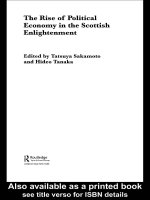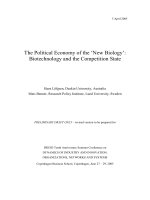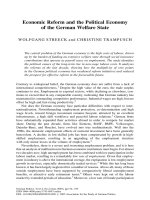Global political economy
Bạn đang xem bản rút gọn của tài liệu. Xem và tải ngay bản đầy đủ của tài liệu tại đây (3.04 MB, 64 trang )
Global Political
Economy
Economy – from the Greek word “household” – assets and
activities for production and exchange
Economics – how to organize production and exchange
most efficiently (minimal cost, maximum gain)
Political economy (Adam Smith) – “branch of science of a
statesman or legislator” concerned with:
“providing a plentiful revenue or subsistence for the people”
“supplying the state or commonwealth with a revenue
sufficient for the public service”
In other words, political economy is about:
the role of the state with regard to the economy,
interactions between political and economic processes, and
distribution of social power based on property and wealth.
Global political economy, or international political economy
– the same, applied to the entire world
Adam Smith (1723-1790)
Key works: “The Theory of Moral Sentiments”,
“The Wealth of Nations”
Classical political economy (Adam Smith, David Ricardo)
The economy is seen as a complex natural organism
Human labour is a key source of wealth
Seeking balance between self-interest and cooperation
“It is not from the benevolence of the butcher, the brewer,
or the baker that we expect our dinner, but from their
regard to their own interest. We address ourselves, not to
their humanity but to their self-love, and never talk to them
of our own necessities but of their advantages. “ (The
Wealth of Nations”)
Division of labour
Key role of the market as an integrating force
Harmony of interests between classes is possible
Key role of the state in maintaining a market economy
Karl Marx (1818-1883)
Key works: “Das Kapital”, “The Communist
Manifesto” (with Friedrich Engels)
Marxist political economy
Market economies are social arrangements created by
specific historical forces
Private property is a social construct, not something
created by nature
Workers produce surplus value
Owners of capital (capitalists) take all or most of it
Accumulation of capital in the hands of capitalists
Power is rooted in ownership and control of capital
Impoverishment of workers
Division of society into classes based on their roles in the
economy and the state
Struggle between classes for power – for control of the
economy and the state
Capitalism will inevitably collapse due to its inherent
contradictions
The two great traditions have determined the bounds of
political-economic thinking since the 19th century
Policies of governments oscillate between these two poles
The key variables:
Whenever capitalism stumbles, Marxism gains attention and
influence
Whenever capitalism recovers and shows its strength,
classical political economy looks more credible
ability of the state to correct the inherent flaws of the market
system
inherent flaws of the state (bureaucracy, waste,
concentration of power, etc.)
Capitalism continues to exist so long as the state and the
market system complement each other effectively
Globalization
Capitalism is historically rooted in international trade
Division of labour on the international scale
Movement of goods, money, people between countries
creates a global network of economic ties
A global capitalist economy gradually emerges as a result
of integration of national economies into a single world
system
Key role of states in its creation and development
First leader – Holland (17th-18th centuries), then - Great
Britain (18th - 19th centuries)
Challenged by others (France, Germany), displaced by the
United States in the 20th century
The Great Silk Road, 3d century BCE – 15th century CE
Global trade and capital flows, 1400-1800
Global trade in consumer goods
International trade flows, 28
Trade flows among
Western
countries
OECD
countries,1992
Underwater Internet cables: see zoomable version at:
/>
19th century globalization led to World War I
The Great War triggered off the global crisis of capitalism
The 1917 Russian revolution
The Great Depression
The rise of fascism
World War II
Challenge to political leaders: restructuring the global
system
John Maynard Keynes (1883-1946), main works: “The
Economic Consequences of the Peace”, “General
Theory of Employment, Interest, and Money”
Franklin D. Roosevelt, US President 1933-1945
1944, Bretton Woods, New
Hampshire:









